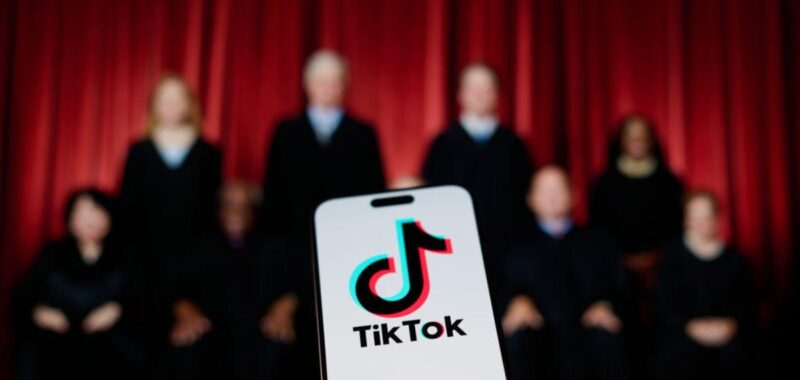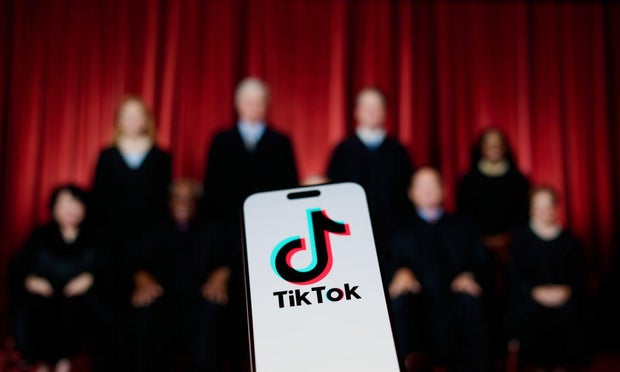Washington — The Supreme Court on Friday rejected a challenge to a new law requiring TikTok to either sever ties with its China-based parent company or be banned in the United States, finding it did not violate the First Amendment rights of the platform or its users.
The high court’s unsigned decision clears the way for the law, passed last April, to take effect at midnight Sunday, and follows years of concerns raised by the federal government — during both the Trump and Biden administrations — about the risks TikTok poses to national security.
In defending the law before the Supreme Court, the Justice Department pointed to two main national security justifications: countering China’s collection of data from TikTok’s 170 million U.S. users and its purported ability to manipulate content on the app to further its geopolitical interests.
The Supreme Court’s unanimous ruling hinged on the first justification: that China, through the app and its parent company, Beijing-based ByteDance, can amass vast amounts of information from American users. The justices found that Congress did not violate the First Amendment by taking action to address that threat.
What the Supreme Court said in its ruling on the TikTok ban
“The act’s prohibitions and divestiture requirement are designed to prevent China — a designated foreign adversary — from leveraging its control over ByteDance Ltd. to capture the personal data of U.S. TikTok users. This objective qualifies as an important government interest under intermediate scrutiny,” the court said, referencing the middle standard applied by courts to assess the constitutionality of a law.
Jaap Arriens/NurPhoto via Getty Images
Under intermediate scrutiny, a challenged law must further an important government interest and be substantially related to that interest to be upheld. It is a less demanding standard than strict scrutiny, the highest level of judicial review, and more stringent than rational-basis review, the lowest, most lenient tier.
The court noted that TikTok “collects extensive personal information from and about its users,” including location data and contact lists. The justices reiterated the government’s concerns that such information may allow China to track the locations of federal employees, craft dossiers of information for blackmail and conduct corporate espionage.
The court’s opinion also cited Congress’ finding that under Chinese law, companies can be required to turn over data to the Chinese government.
“The government had good reason to single out TikTok,” it said.
The court went on to say that the law, called the Protecting Americans from Foreign Adversary Controlled Applications Act, is “sufficiently tailored to address the government’s interest in preventing a foreign adversary from collecting vast swaths of sensitive data about the 170 million U.S. persons who use TikTok.”
Its provisions “clearly serve the government’s data collection interest,” the court said, and are not broader than needed to address concerns about China’s access to Americans’ personal information.
The court noted the government’s interest in preventing China from having control over TikTok’s powerful recommendation algorithm and its ability to covertly alter the content appearing on the app for users in the U.S. But it said the record in the case “adequately supports the conclusion that Congress would have passed the challenged provisions based on the data collection justification alone.”
According to Congress and the Biden administration, the court said, ByteDance uses data collected from TikTok to train the app’s recommendation algorithm and would not agree to stop collecting U.S. users’ data or sending it to China. The government also noted the challenges with monitoring data-sharing between TikTok and its parent company.
“Under these circumstances, we find the government’s data collection justification sufficient to sustain the challenged provisions,” the court said.
Justice Neil Gorsuch issued a separate opinion agreeing with the outcome of the case, but splitting with the court’s legal reasoning. He wrote that the court was right to refrain from endorsing the government’s goal of preventing the purported covert manipulation of content by China.
“One man’s ‘covert content manipulation’ is another’s ‘editorial discretion,'” he wrote. “Journalists, publishers, and speakers of all kinds routinely make less-than-transparent judgments about what stories to tell and how to tell them. Without question, the First Amendment has much to say about the right to make those choices.”
Gorsuch concluded his opinion by noting that “speaking with and in favor of a foreign adversary is one thing. Allowing a foreign adversary to spy on Americans is another.”
The law at issue in the case requires TikTok to either divest from ByteDance or be cut off from U.S. app stores and hosting services beginning Jan. 19. President-elect Donald Trump, who will be sworn in for a second term on Jan. 20, had urged the court to pause implementation of the law to allow him to pursue a “political resolution” once he takes office, but said following the ruling that he “must have time to review the situation.”
White House press secretary Karine Jean-Pierre said the Biden administration will not begin enforcing the law beginning on Sunday, leaving it to the incoming Trump administration.
“President Biden’s position on TikTok has been clear for months, including since Congress sent a bill in overwhelming, bipartisan fashion to the president’s desk: TikTok should remain available to Americans, but simply under American ownership or other ownership that addresses the national security concerns identified by Congress in developing this law,” she said. “Given the sheer fact of timing, this administration recognizes that actions to implement the law simply must fall to the next administration, which takes office on Monday.”


